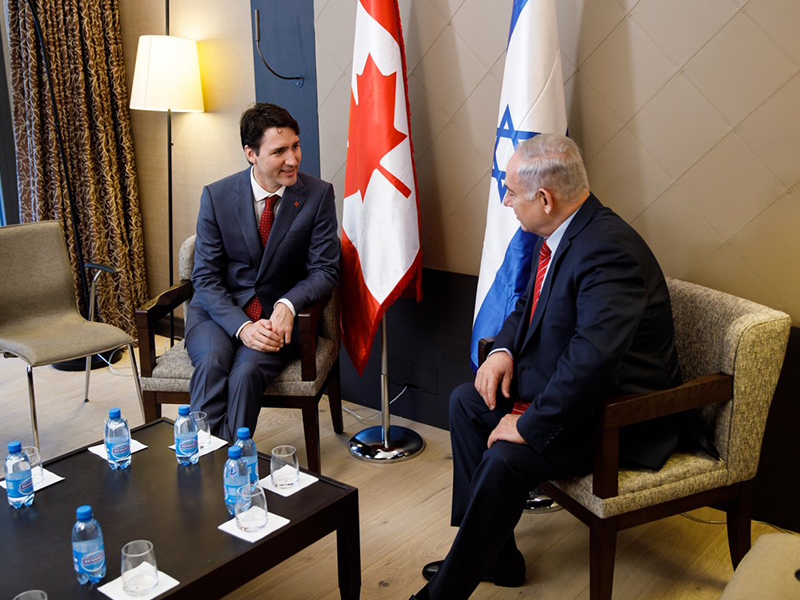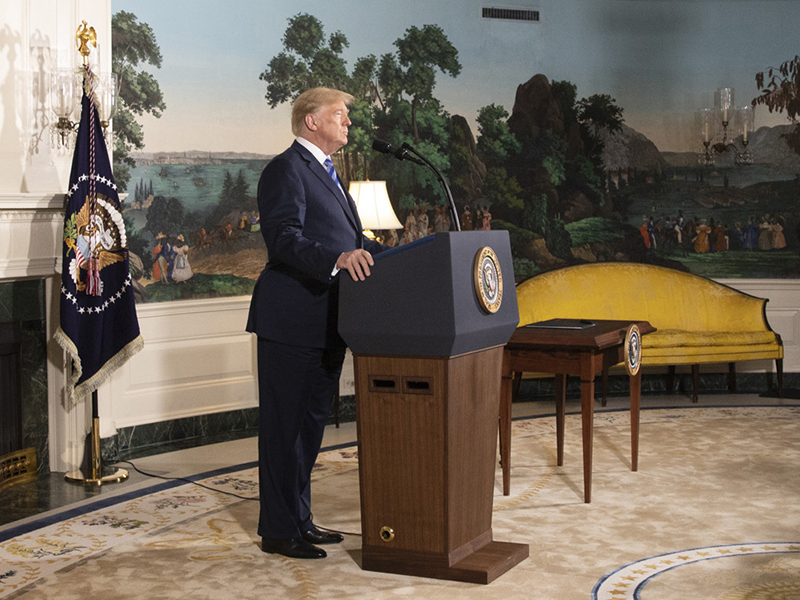Is the Iran nuclear deal dead and buried, or was U.S. President Donald Trump’s decision to pull out of it merely an opportunity to negotiate a better one?
Some Jewish groups in Canada are hoping it will be the latter.
The Centre for Israel and Jewish Affairs (CIJA) noted that despite the existing agreement’s flaws, diplomacy was the best way to block Iran’s path to a nuclear weapon. And B’nai Brith Canada said, “The U.S. decision to withdraw creates an opportunity to negotiate a stronger agreement.”
The Friends of the Simon Wiesenthal Center stated that it is aligning itself with its Los Angeles-based main office, which commended President Trump for withdrawing from the Iranian nuclear agreement and imposing sanctions on the Iranian regime.
READ: TRUMP WITHDRAWS U.S. FROM IRAN NUCLEAR DEAL
In Ottawa, meanwhile, Prime Minister Justin Trudeau acknowledged that the Iran nuclear deal wasn’t perfect, but it nevertheless helped prevent that country from developing a nuclear weapon.
Global News reported that Trudeau said he regretted Trump’s decision to withdraw from the 2015 agreement, formally known as the Joint Comprehensive Plan of Action (JCPOA), which was negotiated by the world’s major powers.
Trudeau said that he respects other countries’ foreign policy decisions, but Canada is firmly aligned with its European allies.
In Israel, Prime Minister Benjamin Netanyahu said in a speech on May 8 that, “Israel has opposed the nuclear deal from the start because we said that rather than blocking Iran’s path to a bomb, the deal actually paved Iran’s path to an entire arsenal of nuclear bombs, and this within a few years’ time.

“The removal of sanctions under the deal has already produced disastrous results. The deal didn’t push war further away, it actually brought it closer.”
Netanyahu said the “deal didn’t reduce Iran’s aggression, it dramatically increased it.
“And as we exposed last week, since the deal, Iran intensified its efforts to hide its secret nuclear weapons program.”
B’nai Brith Canada CEO Michael Mostyn said that, “The JCPOA was never a good deal to begin with and the world deserves a solid agreement that will permanently halt Iran’s nuclear weapons program.
Canada should call for improvements to the deal and maintain its own sanctions targeting Iran’s ballistic-missile programs.
– Shimon Fogel
“The JCPOA had no impact on stymieing the regime’s radical behaviour in the Middle East, nor its public commitment to Israel’s destruction. The Iranian regime and its terror proxies remain a clear and present danger to Canada, its citizens and its national interests.”
Mostyn said that Canada should pull back from its goal of reestablishing diplomatic and economic ties with Iran.
“Any renewed regime presence in Canada would constitute a clear danger to the Jewish community, Iranian dissidents and other targets of the regime, as we have seen in other countries, such as Argentina, Germany and New Zealand,” he said.
CIJA CEO Shimon Fogel said that, “Canada should call for improvements to the deal and maintain its own sanctions targeting Iran’s ballistic-missile programs, which we note (Foreign Affairs Minister Chrystia Freeland) recommitted to in a statement.… All three major Canadian political parties have stated that the success of the nuclear agreement depends on strong verification, to ensure Iranian compliance. We urge Canadian leaders from all parties to reaffirm this common-sense consensus to our allies who are party to the (JCPOA).”

The American move “creates an opportunity to improve the agreement, particularly the elements that address the shortcomings related to inspections and the possible military dimensions of Iran’s nuclear program,” Fogel said.
“The JCPOA was predicated on putting in place a regime of monitoring and inspection that presumed full disclosure on the part of Iran about its activities. Since Iran was not truthful and did not disclose the full range of their nuclear program, the resulting deal could never have the capacity to properly and fully inspect and monitor what they were doing. This was compounded by the Iranian decision to shift important parts of the program to the military, which are entirely inaccessible to the International Atomic Energy Agency. If the initial premise is flawed, then any outcome that flows from it is flawed, and that is the real concern.”
Avi Benlolo, president and CEO of the Friends of the Simon Wiesenthal Center, said the JCPOA failed to moderate Iranian behaviour commensurate with international standards. Iran continues to support terrorism, threaten its neighbours and develop missiles that can carry nuclear warheads, he said.
He said Canada should consider imposing new sanctions on Iran, especially considering America’s moves in that direction.
The deal didn’t push war further away, it actually brought it closer.
– Benjamin Netanyahu
Canada and the United States are now discussing trade issues and “Trump has made it clear that anyone aiding and abetting Iran through trade and diplomacy will be in his cross hairs,” Benlolo said.
Trudeau has called for the Canadian embassy in Tehran to be reopened, but negotiations have been hampered by the death of Kavous Seyed-Emami, a Canadian-Iranian academic, in an Iranian jail earlier this year. Iranian authorities say that he committed suicide while in custody, a claim that’s been rejected by his family and friends. In 2003, another Iranian-Canadian, photographer Zahra Kazemi, died while being held in the same prison.
In 2012, then prime minister Stephen Harper suspended diplomatic relations with Iran over its human rights abuses and support of terrorism.
Trudeau has said that he would like to reestablish diplomatic relations.
